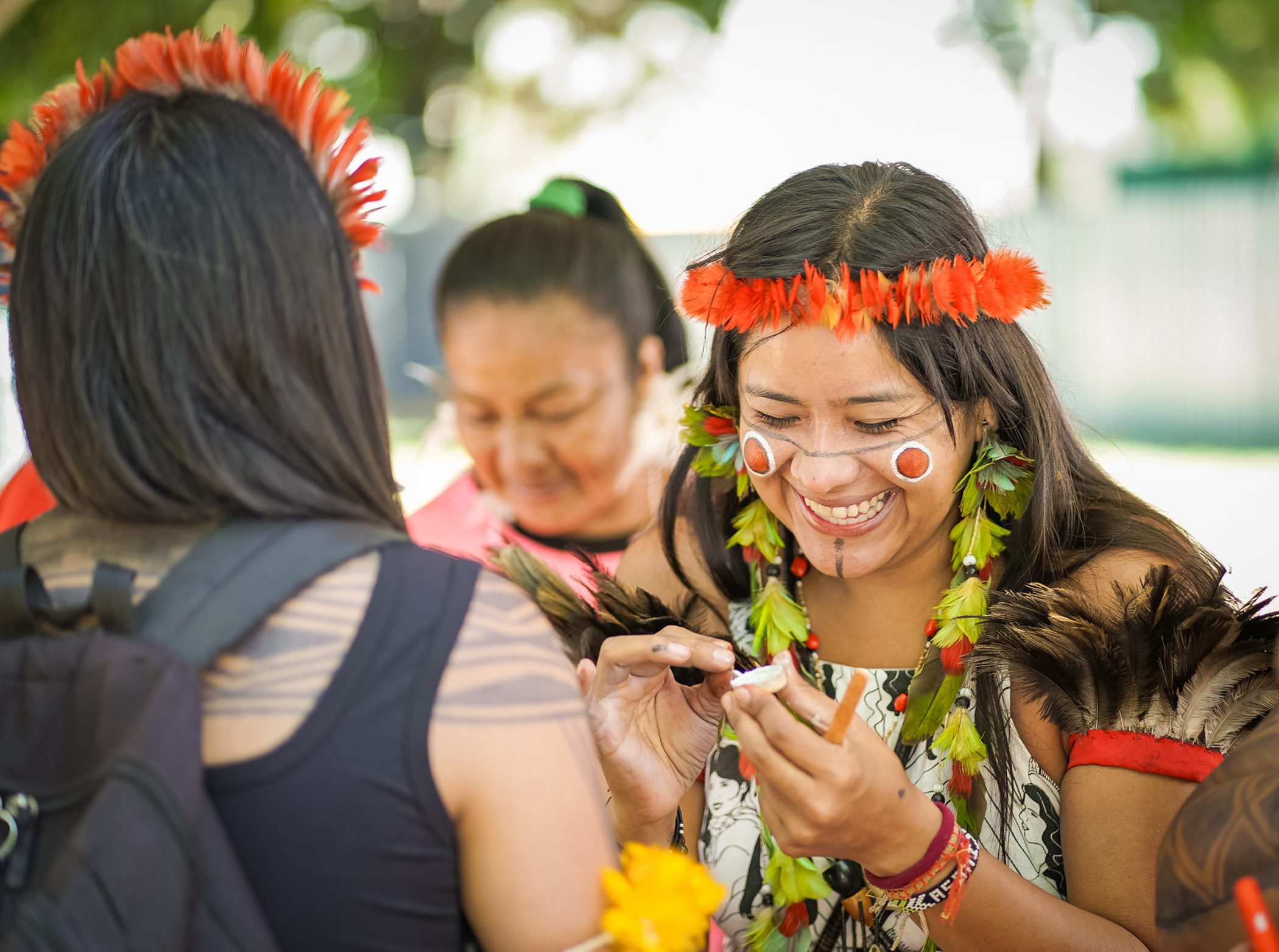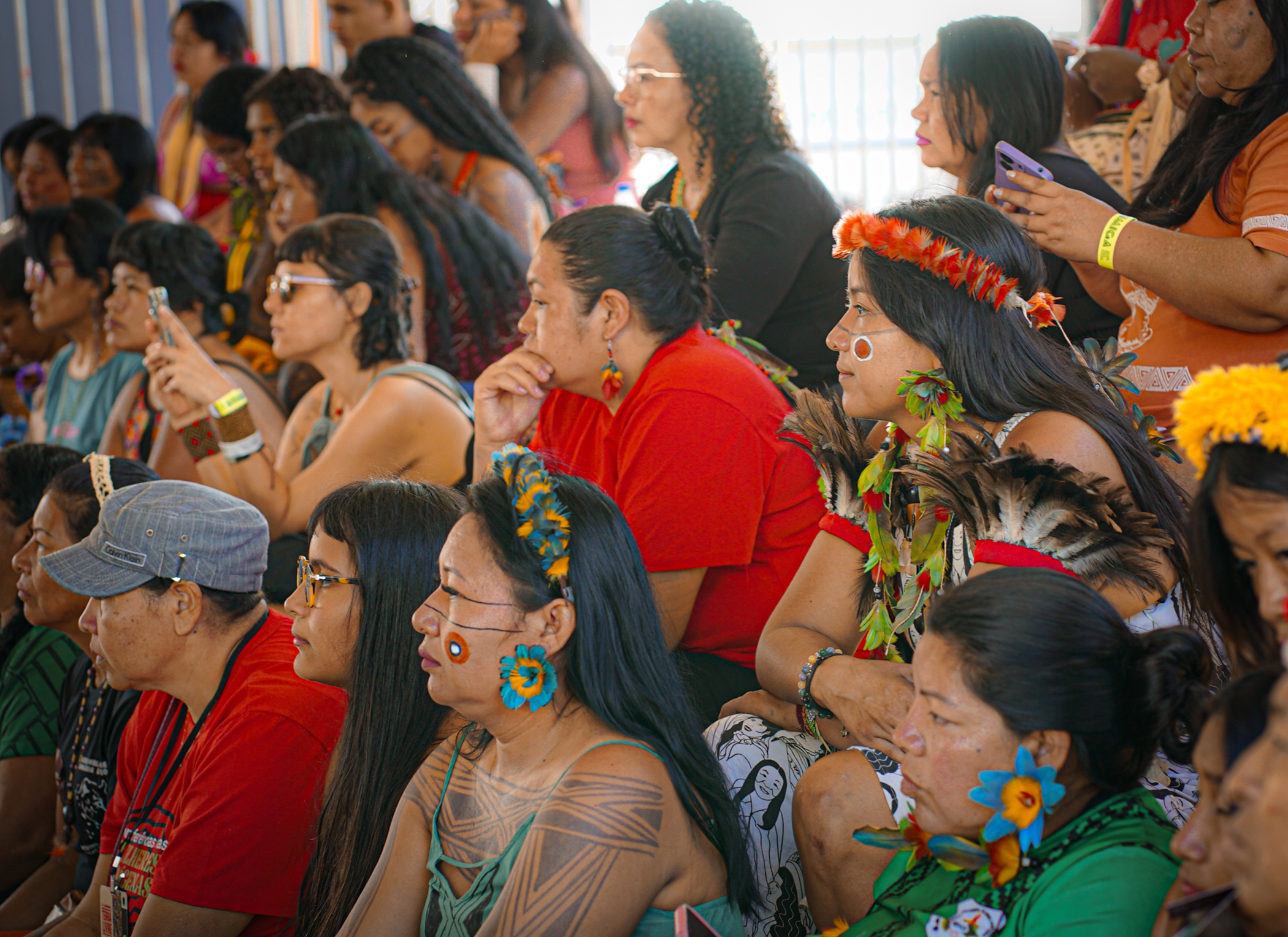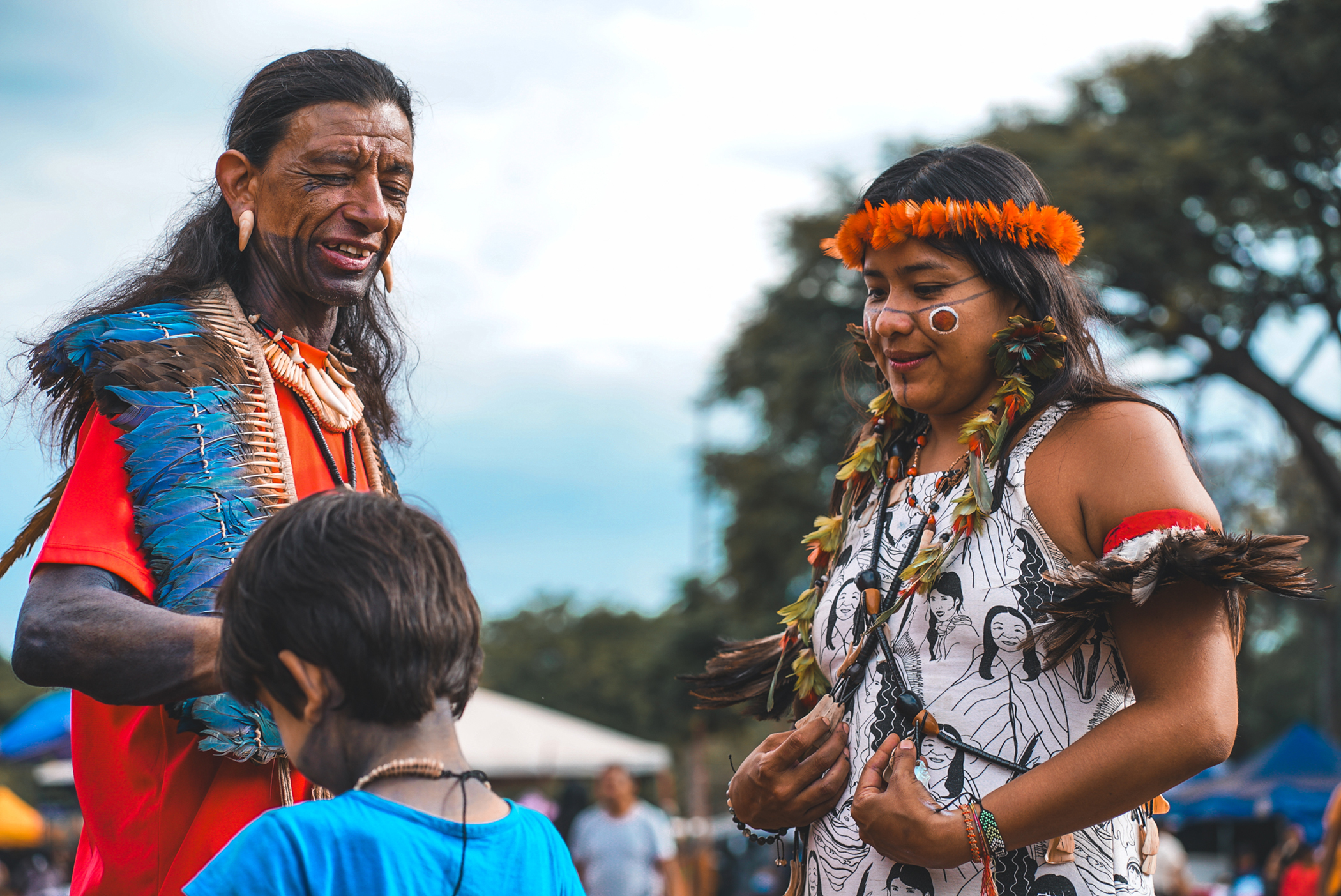Bees don’t so much buzz as they do hum. The sound emanating from a single tiny bee can fill a room, announcing its presence. Alone, its hum is a robust serenade, a tenor tune that eases its way out on a warm day. But joined by a swarm, it becomes a choral wonder, a harmony so striking it makes you wonder whether it’s the sound of celebration or impending danger.
This mighty sound is what Global Citizen Prize Winner Taily Terena was named after, the song of the bees. Talking to her feels like encountering a gentle buoyancy like the invisible patterns bees trace as they fly. Her unfiltered emotions often arrive before her words do, revealing her not just as a force in the climate justice space, but as a heart wide open to those who strive for unity.
Who Is Taily Terena?
“I’m a kind and lovely person, but I can be stubborn if it’s needed. If there is something that I really truly believe in, I’m really stubborn, but in a good way,” she explains.
The Indigenous land and climate defender finds joy in the outdoors and among animals, telling Global Citizen that she’s intensely connected to the natural environment. Terena relishes in nature’s beauty and listens closely for its lessons.
“I learn a lot from her,” she says of nature, “I think that's why I am an optimistic person, because she teaches us how to start again. Like if there is a big fire, we’ll have a little rain, and then things will grow again.”
It’s been over sixteen years since Terena started her work as a climate defender, exposed to the global stage at a young age. She was just a teenager; her small voice carried a powerful call to justice for her home, Terena Nation, and her shoulders draped in the support of her ancestors, as she entered rooms that those who came before were never privileged enough to see.
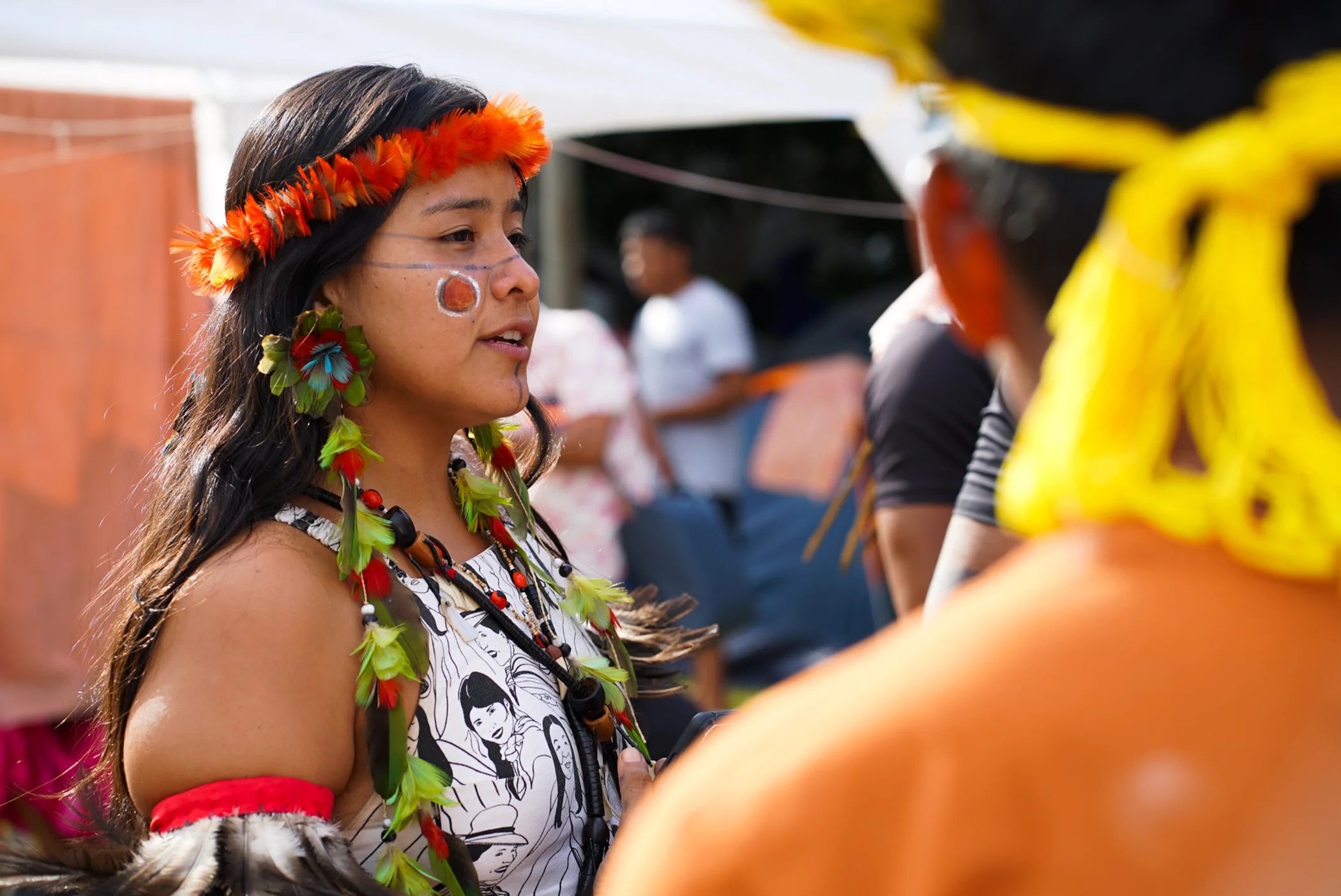 Brazilian Indigenous climate defender, Taily Terena, uses her anthropology qualification — which focuses in women's cultural preservation and intergenerational knowledge — to call for climate justice. | Homero Flávio for Global Citizen
Brazilian Indigenous climate defender, Taily Terena, uses her anthropology qualification — which focuses in women's cultural preservation and intergenerational knowledge — to call for climate justice. | Homero Flávio for Global Citizen
Global Citizen Prize for Terena Nation
Today, Taily Terena is a proud defender of the land, its people, and its ecosystems. Terena Nation is found on the world’s biggest wetland in Brazil, the Pantanal, which is now in danger of drowning as a result of the climate crisis. The threats that Terena Nation and the Terra Indígena Taunay Ipegue (Terena’s own community) face are many. The largest of them are human-caused climate change — in particular agrobusiness — and the relentless impacts of colonization.
These are the barricades to survival that Terena works to knock down in her demands for the protection of the land. She does this loudly, but never alone. And as she is honored with the 2025 Global Citizen Prize, it’s important to her to recognize that the win is not for a singular person.
We can be warriors. We can be resilient. But damn, we know how to enjoy life!
“I see the prize as a recognition not of me, because I don't believe in individual things. It is a collective thing,” she says. “Me winning this prize, it's to show that collectiveness is important. I didn't do things by myself, every time I was with my people or helping other Indigenous nations here in Brazil. This prize is to show that collectiveness can reach important spaces.”
She adds: “It's also hopeful because it will help to [bring visibility] to what is happening here in my community. What’s happening in the Amazon is not just happening there, it’s happening here too.”
Through the struggles for land justice and climate advocacy, the Terena people, known to be agriculturists and water protectors, remain resilient. No matter the challenge this volatility rises above all — a quality the Indigenous activist herself gushes about as she speaks about her people.
“We're not going to fight with no purpose, but if we need to fight we will do it. This is something that’s in our creation story, and I love our creation story because it says that we are actually a people that likes to laugh, that likes to make jokes, that knows how to enjoy life. I think this is what I want people to know about us. We can be warriors. We can be resilient. But damn, we know how to enjoy life!”
Terena grins as she raves about the love for her people and their traditions, their culture remains tied to her core as an anchor that grounds her in the battles against adversity, yet lifts her up when she needs it the most, bringing about much needed lightness when things feel their toughest.
She recounts a story from her younger days in the activism space, when, under the right-winged Bolsonaro government, democratic leader Luiz Inácio Lula da Silva (commonly referred to as Lula) was unlawfully arrested in a baseless relation to a corruption scandal.
“Before he was president as he is now, Lula was incarcerated. It was showcased live on TV and everybody was seeing that Lula was being arrested,” she says, “I remember that I went to visit a friend in another Terena community, and I remember me and him watching the TV, shocked and crying because we thought, ‘my god, this is the same Lula that is the main character of Brazil, loved by hundreds of people, has support, resources, lawyers, and everything. He's being in jail and with no reason, he's not justified.’”
She continues: “If this is happening to Lula what is going to happen with us? With no one to support us, we don't have the resources for good lawyers and the Bolsonaro government is totally against Indigenous peoples.”
It was in these moments of fear when her friend’s aunt, an older representative of the community, appeared to remind them of exactly who they are.
Terena goes on: “She came and turned down the TV really angrily, and she said, ‘Are you kidding me? Our people survived hundreds of years of violence, of repression, but we stand up. We never let our heads down, and I'm not okay with you guys doing that. You are the future generations. You have to keep fighting as our ancestors did. We are here today because we fight, not cry. Come on, stand together, we are having a celebration outside. The first thing in the fight for our people is having a good meal!’”
She laughs as she relays the memory, a story that tumbles easily out of her.
“So we went outside and we had fun, ate dinner, and spent the night talking. This is our people,” she beams.
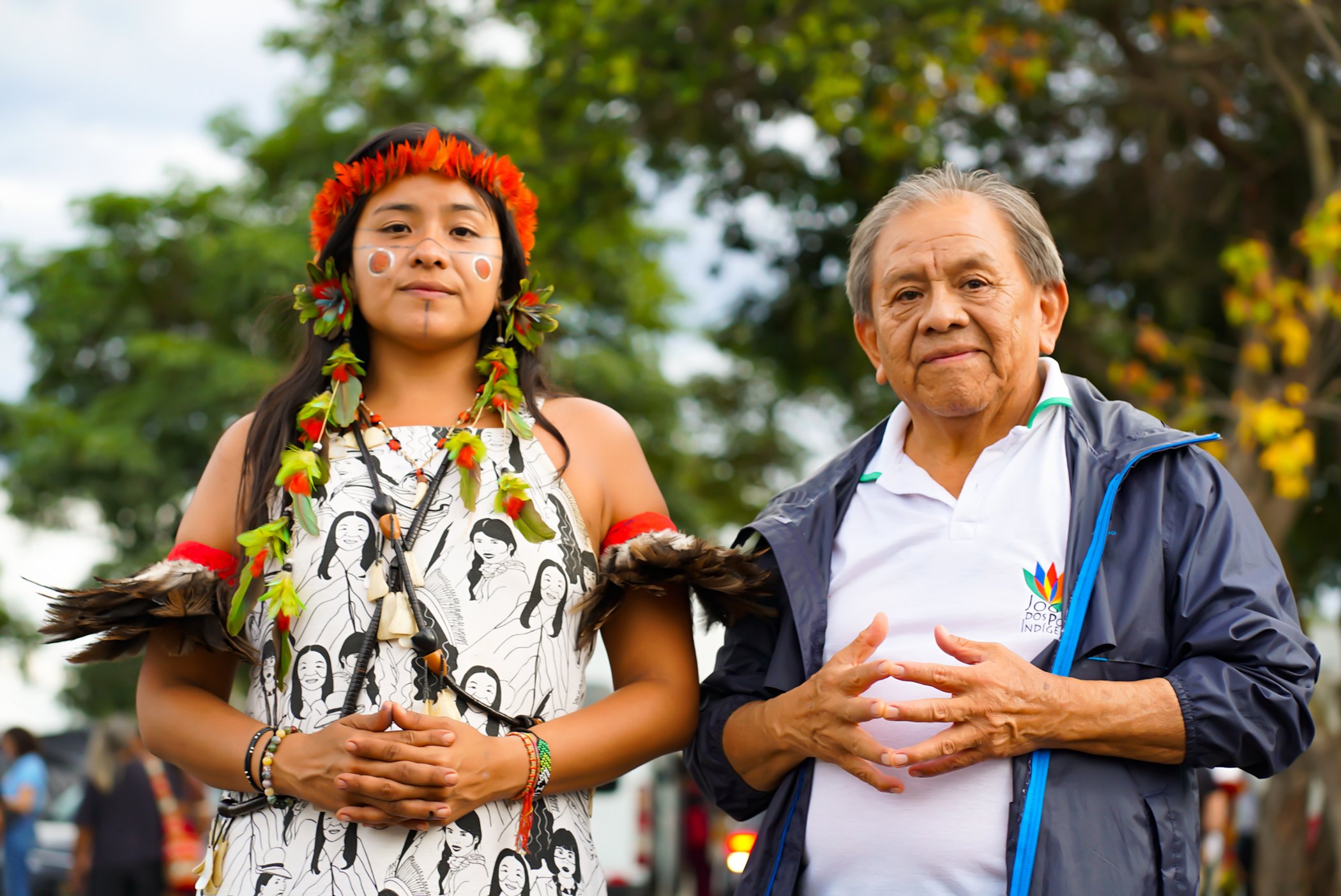 Global Citizen Prize winner, Taily Terena, stands with her father, Marcos Terena. Brazil, 2025. | Image: Homero Flávio for Global Citizen
Global Citizen Prize winner, Taily Terena, stands with her father, Marcos Terena. Brazil, 2025. | Image: Homero Flávio for Global Citizen
Global Citizen Prize winner, Taily Terena, stands with her father, Marcos Terena. Brazil, 2025. | Image: Homero Flávio for Global Citizen
Indigenous Knowledge Is Science
Though she doesn’t quite enjoy being described by her accolades, Terena is an anthropology graduate who uses this study to further her work as an Indigenous and climate defender. She specifically focused on women's cultural preservation and inter-intergenerational knowledge.
While Terena has this as an achievement, and she cherishes what the study has taught her, she much prefers to champion Indigenous science. This is a discipline that is studied, not in a classroom or a lab, but by living on, and observing, the natural environment through the eyes of the many generations that came before to the point of absolute understanding.
“When people talk about western science, it’s all about the labs and the tests, and everything is so high-level,” explains Terena. “But then [in contrast], they refer to our science as ‘Indigenous knowledge,’ ‘traditional knowledge,’ it's knowledge, not science.”
“And it's not because I'm against the word knowledge,” she continues, “but it’s how the west undermines that knowledge just because we don't prove things in the same way as western science, and just because we don't have the same system.”
Things that Indigenous people across the globe have been speaking about, warning about, and advocating against have slowly come to be proven in the eyes of western science, after years of tests and studies — a phenomenon that Terena finds frustrating.
“I think people need to decolonize their minds and understand what we are talking about when we are talking about Indigenous science,” she says. “I don't need western science to prove that the bird that is singing to me in the night is telling me that it's going to rain the next day. We know these things. It's not in the lab, it’s ancestral knowledge.”
She took this same vigour for Indigenous science and the need for decolonization to UN’s Climate Conferences, also known as the Conference of the Parties or COP, delivering addresses on behalf of Terena Nation, and other Indigenous communities.
If we are not sitting at dinner to eat together, we are being served on the menu.
COP & The International Community
Though she’s now a seasoned representative on the international stage, Terena’s first COP was not a breeze, in fact, it began with tears.
“When I first attended COP, I was really disappointed. It was a heartbreaker because I was really optimistic. I thought, ‘I'm going to a conference where we're going to talk about solutions for climate change.’ Poor me, so naive,” she says.
She elaborates: “I went there and I saw people were doing business with our rights, people were doing business with the land, and not even talking about how they would really avoid climate change. So I remember, I cried, I didn't want to return to that place.”
But she did. She returned the following year, and attended several international conferences after that, using her voice, her anthropological knowledge, her passion for women’s rights, and the Indigenous science she champions with her whole heart to continue to call for change on the global stage. Why? Well, it was all thanks to advice from an older mentor from a completely different country, who saw her crying that day.
“He came to me and he said, ‘Don't cry my niece, it's hard, but you can't give up. This conference is a dinner table. If we are not sitting at dinner to eat together, we are being served on the menu.”
So she picked herself up and carried on. A natural champion of unity through diversity, Terena has come to adore meeting people from so many different nations — each one standing for the same cause at these global gatherings.
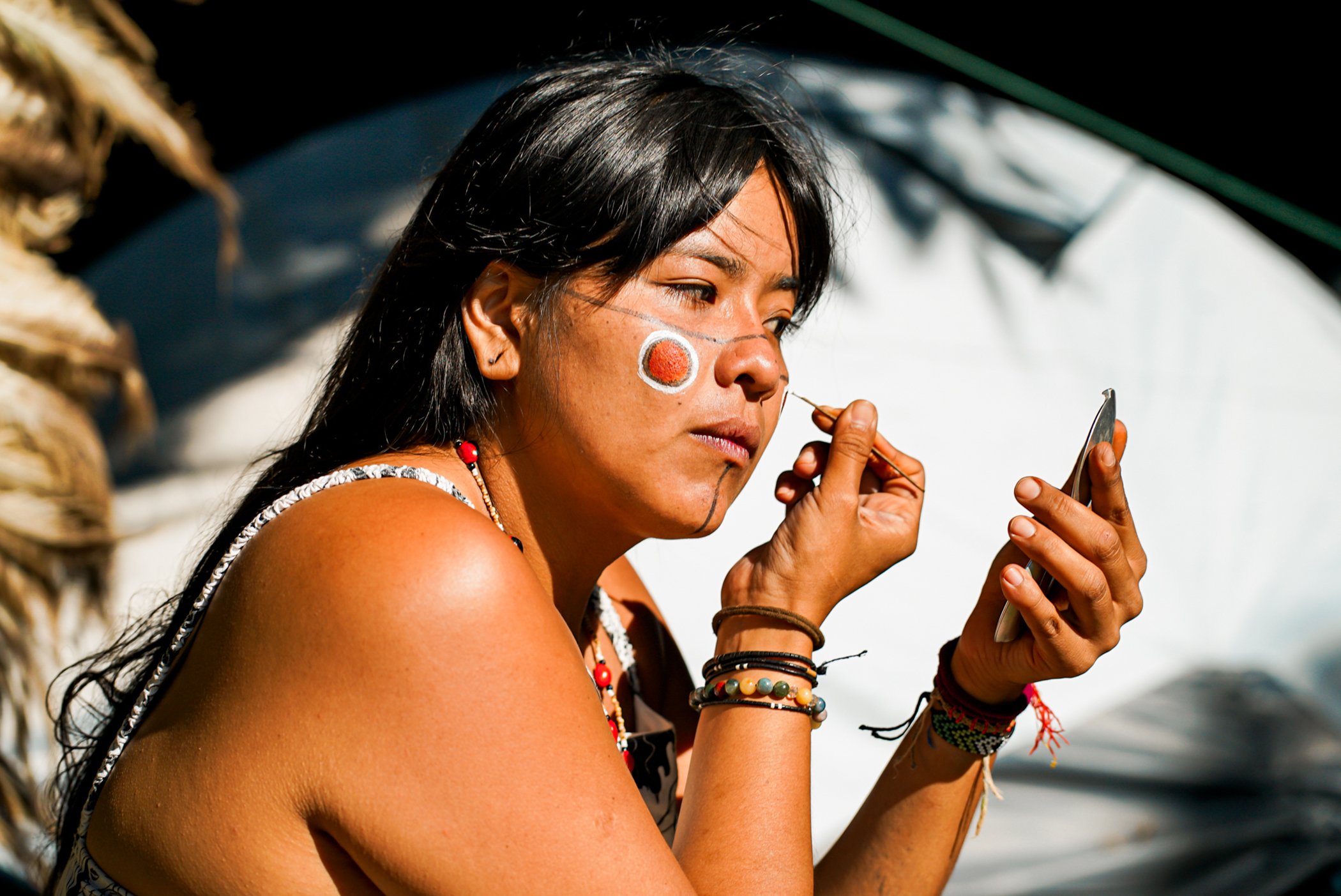 Taily Terena, paints her face in preparation for an annual event with Indigenous community members in Brazil, 2025.
Taily Terena, paints her face in preparation for an annual event with Indigenous community members in Brazil, 2025.
Beauty In Diversity
“I love our differences,” she says. “I think it's so beautiful. This idea of monoculture or mono-god, I don’t agree with. No, no, no, no. It's the diversity that makes us unique and beautiful. The globe is like a puzzle. The pieces cannot be the same for the puzzle to fit.”
She stands like a vigorous bee whose song has traveled far beyond her borders, opening doors for younger generations to join the swarm and carry on the fight. And while she turns her focus toward uplifting the youth, her heart remains full of gratitude for the elders and ancestors who came before.
To them, she says: “Thank you for all the things that you’ve invested in me. For all the stories, the moments, the guidance, and for not giving up on me. I am here. I will continue to share all this knowledge, and I will guarantee our future generations know who our people are.”
